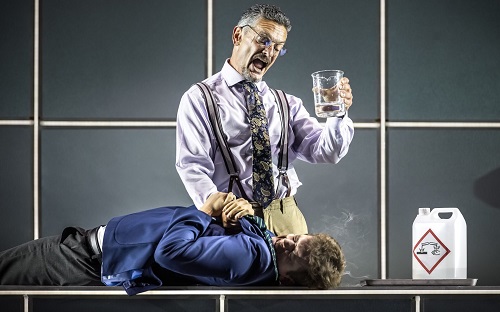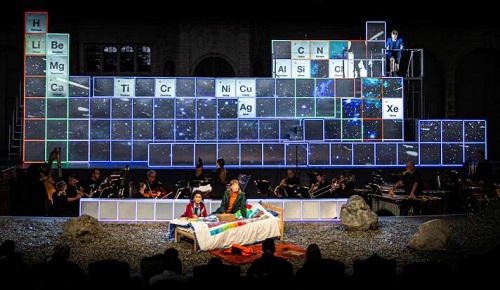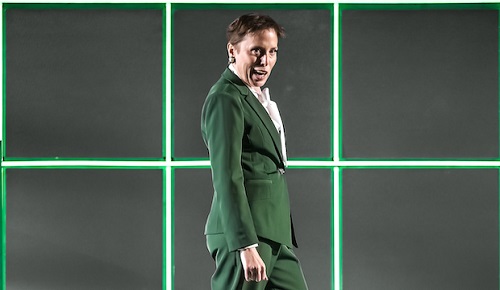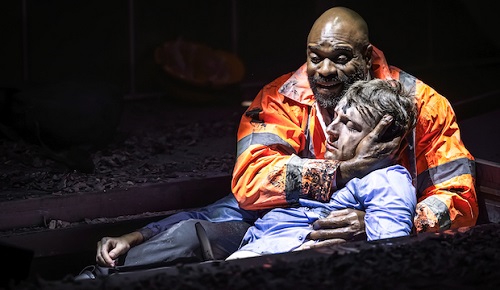Simon Mayo’s book Itch was written, originally, for his science-loving son; two more books and a TV series later, Itch is now an opera by Jonathan Dove with a libretto by Alasdair Middleton based on Mayo’s books Itch and Itch Rocks. Itch was commissioned by Opera Holland Park (with support from co-producers, the Canadian Opera Company).
Jonathan Dove and Alasdair Middleton’s Itch premiered at Opera Holland Park on 22 July 2023, directed by Stephen Barlow with Jessica Cottis conducting the City of London Sinfonia. Though based on a book aimed at children aged 10 to 14, Dove’s opera is not a conventional children’s opera; it is an adult piece about children that is family-friendly. In a sense, it has parallels with Humperdinck’s Hansel and Gretel.
The plot operates on multiple levels: on the one hand it is about nerdy Cornish school boy Itchingham Lofte (Adam Temple-Smith) who is obsessed with collecting elements, aided by his light-fingered sister Jack (Natasha Agarwal) and the local hippy Cake (James Laing). But there is a thriller element too: the discovery of a new element means that everyone wants it, the dodgy Greencorps which happens to sponsor Itch’s school, as well as other more dubious characters. Itch and Jack get abducted and escape, but both are suffering from radiation sickness and Itch feels he needs to return the rocks to the earth.

But there are other levels to the work, the idea of man mistreating the environment and earth’s resources with the fight over the new element being a metaphor for this, whilst Victoria Simmonds’ Watkins is a supporter of the Gaia theory and sees the new element as a way for the earth to heal itself. Then there are the Wagnerian Ring parallels, the new element emerges from the earth at the opening and at the end is returned, with the fighting over it causing untold problems, very much akin to the Ring itself. And, in an early scene, Itch, Jack, Itch’s father and Bob Evert descend into the depths of the local tin mine in a scene reminiscent of the descent into Nibelheim. The ending is pure opera, too, with the sick Itch being rescued from the depths of the earth (where Itch has gone to deposit the new element) by his father, providing an element of redemption.
Dove has scored the work for 12-piece instrumental ensemble (violin, cello, bass, flute, clarinet, bassoon, horn, trumpet, trombone, percussion, harp, piano) along with an element of electronics to create extra sounds representing the new element. The result is a compact score (8 singers and 12 players with doublings for both) which seems to expand remarkably; there is little that feels chamber about the piece.
The music has plenty of Dove’s trademark lyrical, often yearning, melodies over regular repeated rhythms, yet the writing is full of character and even the smallest roles (such as Itch’s mother) are sharply delineated. The opera unfolds in essentially lyrical dialogue, but whilst there is the pacey thriller element arching through the plot, Dove and Middleton make time for more contemplative elements, including major solos for Adam Temple-Smith’s Itch.

Barlow’s imaginative production is based around Frankie Bradshaw’s set which is shaped like the periodic table. This structure is able to display video images (projection designer Jack Henry James Fox for Really Creative Media), but also individual elements. There is a fun element, too: there are plenty of explosions and the opera opens with a literal bang as one of Itch’s experiments goes wrong and he singes his eyebrows.
Having Itch played by an adult singer is a risk, but Adam Temple-Smith brought just the right element of naivety and directness to the role. He made Itch appealing and believable whilst never descending into outright childish parody. It is a big role, certainly needing an adult singer; not only does Temple-Smith have a wonderfully engaging hymn to the elements, listing the ones he has collected so far with commentary from his mother (Bottone) and sister (Agarwal), but he later has a more thoughtful, introspective solo. Temple-Smith made an engaging hero and managed to imbue him with depth.
Natasha Agarwal was completely delightful as Itch’s sassy sister, Jack. Light-fingered and not always supportive of Itch, Agarwal made Jack an appealing sidekick and the combination of the two characters provided a nice sense of light and shade during the drama.

Rebecca Bottone made Itch’s mother, Jude, suitably mother-like, despairing of her son’s inconvenient hobby and his tendency towards accidents, explosions and smells. Jude is a small role, and after her opening scene Bottone transformed into the untrustworthy executive Roshanna Wing, with Bottone using Wing’s high-lying lines to wonderfully dramatic effect. You always knew who this was and knew not to trust her.
James Laing made an engaging hippy surfer, Cake, who supplies Itch with some of his elements. But Cake also provides an element of parable, as he is the first to suffer from radiation sickness and Laing was touching in his death scene with its Erda-like prophecies of doom. Laing then reappeared as the truly scary Berghahn, Roshanna Wing’s sidekick. And, clearly both Laing and Bottone were relishing the challenge of two different roles, particularly the way that both Wing and Berghahn were a manifestation of Greencorp’s untrustworthiness and sense of pure self-interest.
Eric Greene was Itch’s father, Nicholas. This was a slightly underwritten role, as Nicholas clearly has secrets; he works for Greencorps in an unspecified role. But Greene was touching in the way he lamented that he was always late when it came to his son, missing the important moments in the boy’s life, and this led, of course, to the wonderful ending where Greene’s Nicholas saves Temple-Smith’s Itch at the very end.

Robert Burt was the bluff Bob Evert, owner of the tin mine, who got a wonderful moment where Evert laments the decline of the mine from functioning entity to visitor experience. And Burt then reappeared as the delightfully thuggish Kinch, sidekick to Nicholas Garrett’s Nathaniel Flowerdew. Flowerdew is a disgraced scientist, reduced to teaching at the school but wanting part of the action, and is the closest the opera has to a real villain. Garrett was delightfully unscrupulous as Flowerdew, relishing the character’s lack of morality.
Victoria Simmonds was Watkins, the good teacher, a sympathetic character who again got her moment with her expounding the Gaia theory and in a sense Simmonds’ Watkins was the good thread running through the plot, counterpoise to Garrett’s Flowerdew and Bottone’s Roshana Wing.
At Opera Holland Park, Itch received a terrific performance, all the singers giving committed, intelligent performances, full of character, whilst in the pit Jessica Cottis and the City of London Sinfonia clearly relished Dove,s imaginative textures. Cottis kept the action pacey when it was needed but allowed the more lyrical moments space.
Dove’s music brought remarkable depth to what could easily have simply become a terrific romp, creating something that is accessible yet not facile. It is unusual in many ways with a science-based thriller-plot and a hero who has no love interest, yet it works and creates something which is far more than a novelty. The work will, I think, repay further listening.
Robert Hugill
Jonathan Dove: Itch
Itch – Adam Temple-Smith, Jack – Natasha Agarwal, Jude/Roshanna Wing – Rebecca Bottone, Nicholas – Eric Greene, Bob Evert/Kinch – Robert Burt, Cake/Berghahn – James Laing; Watkins – Victoria Simmonds; Nathaniel Flowerdew – Nicholas Garrett; Director – Stephen Barlow, Conductor – Jessica Cottis, Designer – Frankie Bradshaw, Lighting designer – Jake Wiltshire, Projection design – Jack Henry James Fox, City of London Sinfonia
Opera Holland Park, Kensington, London; Saturday 22nd July 2023.
ABOVE: Adam Temple-Smith (Itch) and Victoria Simmonds (Watkins) (c) Craig Fuller